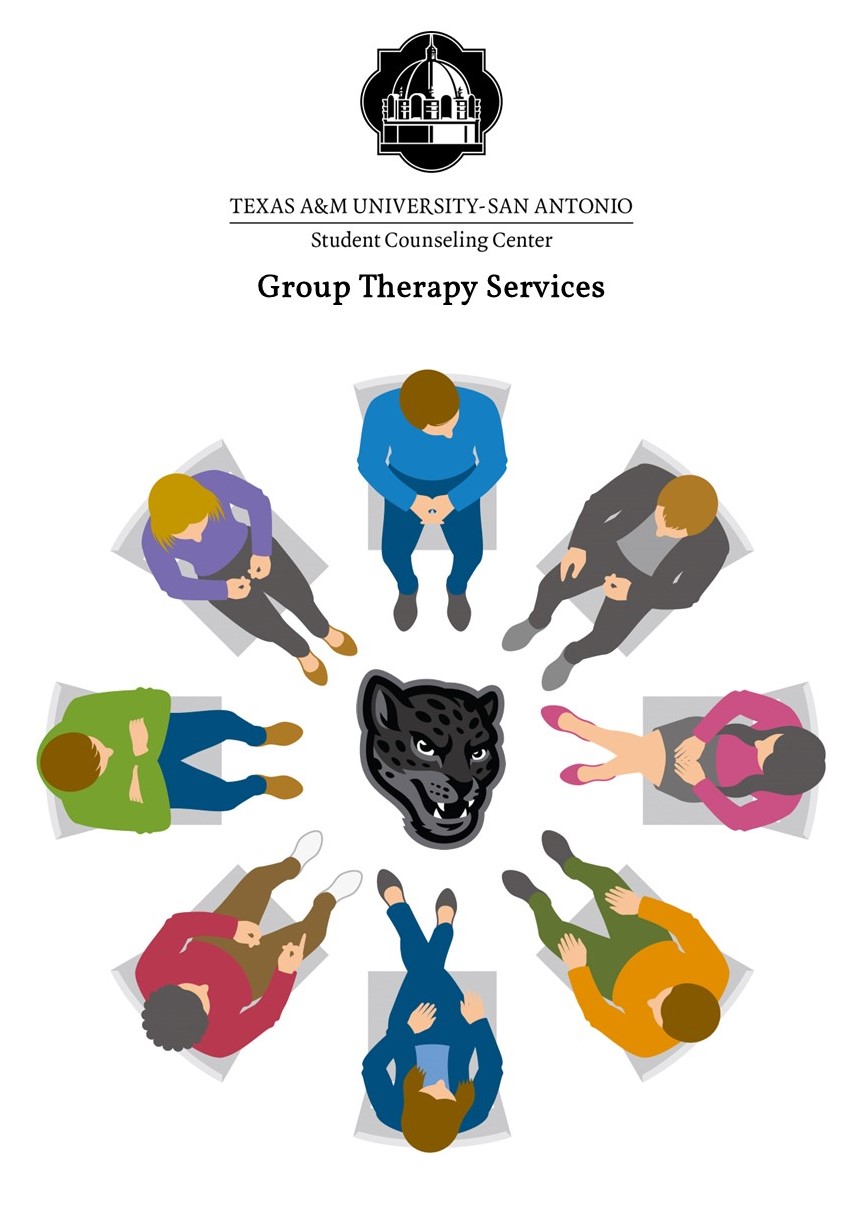Group Therapy
The Student Counseling Center offers group therapy services to address student concerns in various areas. An initial appointment is required to join group therapy. All groups are free and confidential for SCC clients.
Group therapy is a form of psychotherapy that usually involves anywhere from 5 to 10 individuals and 1 to 2 experienced group therapists. Most therapy groups meet every week at the same time for 1-2 hours. During this time, group members discuss their issues and offer each other support and feedback. Interpersonal interaction is highly valued and encouraged. Group therapy may benefit students who have relationship difficulties or want to learn about themselves and their connections to others. Below is a list of frequently asked questions regarding SCC's group therapy services.

Frequently Asked Questions about Group Therapy
What Is Group Therapy?
Group therapy is an interactive way to speak with peers and therapists about what is going on in your life. Commonly, group therapy is when approximately 5-10 individuals meet face-to-face with one or more trained group therapists to discuss and process current concerns and challenges. Examples might include stress, self-esteem, self-confidence, anxiety, depression, relationships, family, and coping skills. Group members frequently provide feedback to one another by expressing their feelings about what someone says and does. This interaction provides group members with an opportunity to learn more about the way they interact with others, as well as gain a sense of self-confidence. The situation is unique because it's a safe, supportive, and non-judgmental environment.
The content of group therapy sessions is confidential; what group members talk about and share is not discussed outside of the group. Given the significance of this topic, confidentiality is frequently discussed among group members throughout the group.
Is Group Therapy effective?
Yes! Research indicates group therapy is an effective treatment modality to help individuals improve their symptomology and develop effective communication and interpersonal skills. Under the skilled direction of a group therapist, the group can support one another, offer alternative ways of approaching situations, and gently confront each other. In this way, challenges become resolved, alternative behaviors are learned, and individuals develop new social skills or ways of relating to others. During group therapy, individuals begin to see that they are not alone and others share similar struggles. A supportive group can help individuals feel connected to others who might share similar goals.
Group therapy also provides an opportunity to:
- Explore issues in a social setting that more accurately reflects real life.
- Interact with peers who present with a shared purpose of what they hope to accomplish from group therapy.
- Observe and reflect on one's social skills, as well as others' social skills.
- Benefit both through active participation and observation of others.
- Provide and receive immediate feedback about concerns, issues, and problems affecting one's life.
- Work through personal concerns in a supportive, confidential atmosphere and simultaneously assist others in working through their problems. In other words, many individuals report they don't feel alone given the support and encouragement received from others in the group.
How do I know if Group Therapy is the right fit for me?
It is usual for students to have fears or anxieties about "fitting in" to a therapy group. We are here to help. We encourage students to contact the Student Counseling Center at (210) 784-1331 should they have any questions or concerns about their appropriateness for group therapy. Group therapy offers an opportunity to work through an array of different problems. Often, unexpressed feelings are a significant reason individuals experience difficulties, and group therapy can help individuals learn effective ways to express thoughts and feelings. Self-disclosure is an influential part of group therapy and can impact how much is taken from the group. How much individuals share about themselves depends upon what they are most comfortable with. Suppose you have any questions about what may or may not be helpful to share. In that case, you are encouraged to ask the group, the group facilitator, or a licensed mental health professional at the Student Counseling Center.
What are Texas A&M University-San Antonio students saying about their participation in group therapy?
- "I appreciated having community support and relating to others' experiences, knowing I am not alone."
- "I heard different points of view, which made me think of my own. The atmosphere was very inclusive."
- "Group was beneficial in learning how to manage my anxiety while at the same time not being overwhelming. I liked all the handouts and the conversations. The group leaders were very caring, helpful, and understanding."
- "I liked sharing experiences in a safe space."
- "Participating in group therapy helped me feel less isolated. It also helped me push myself to open up more."
- "I learned that I wasn't alone in my struggles, that many others are going through the same experiences."
- "It motivated me to be more involved in school and isa great way to meet new people."
